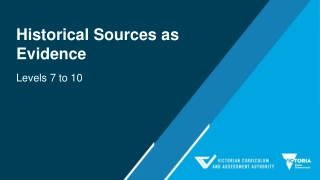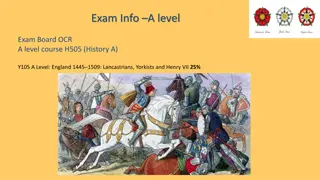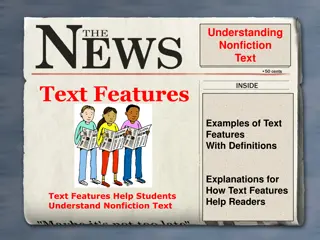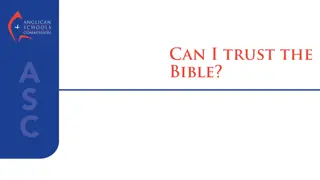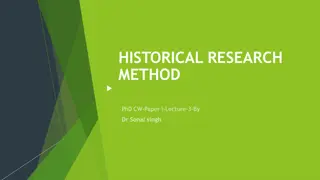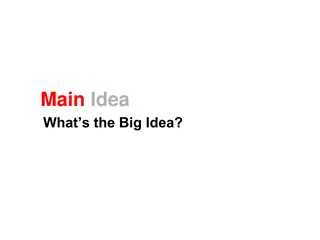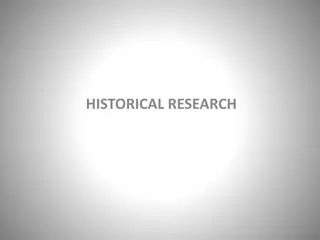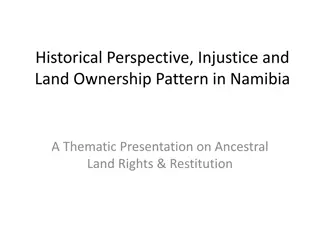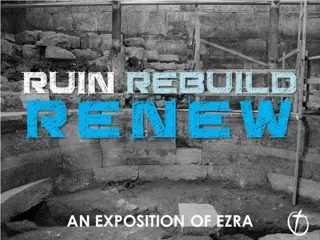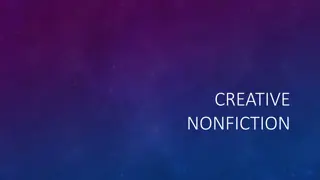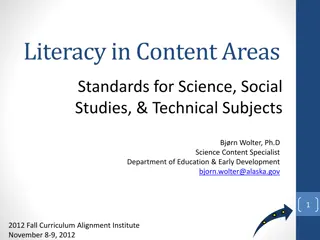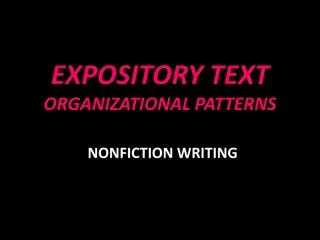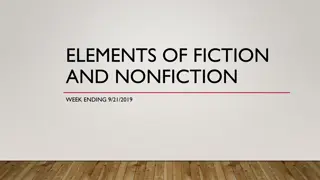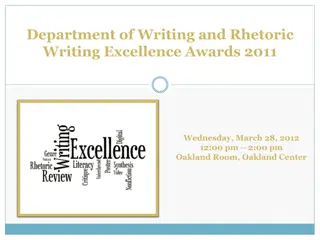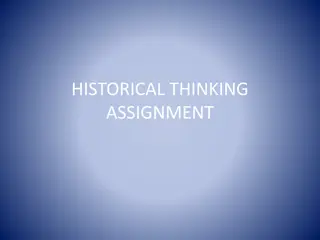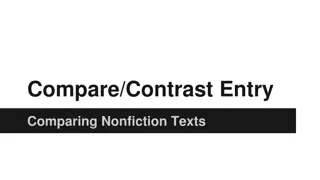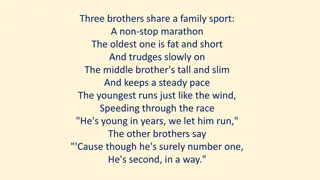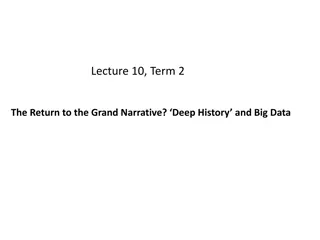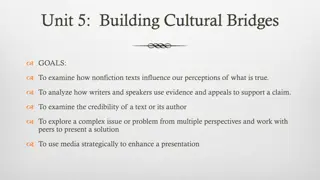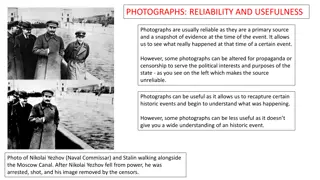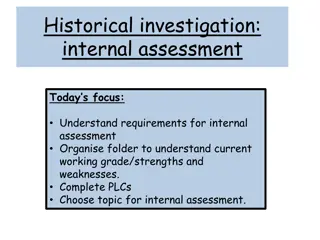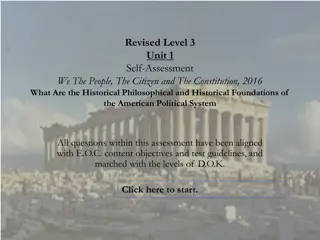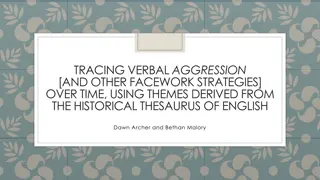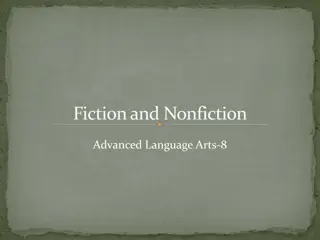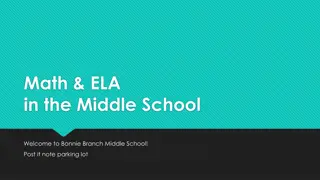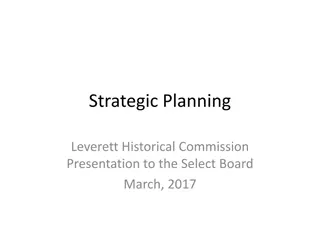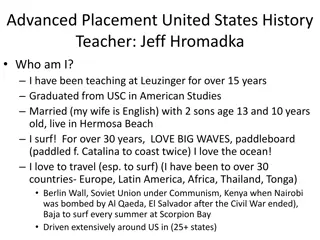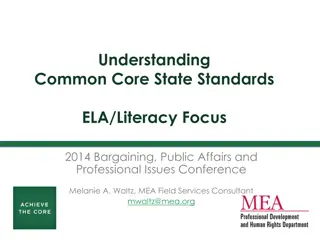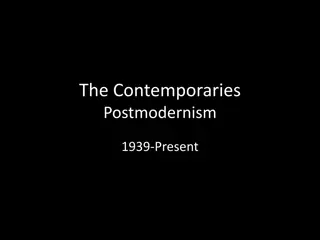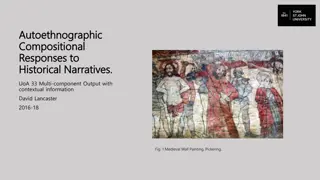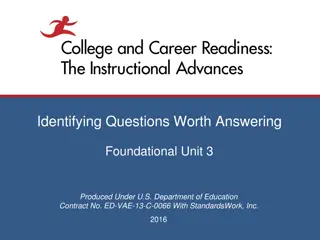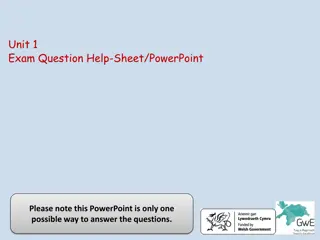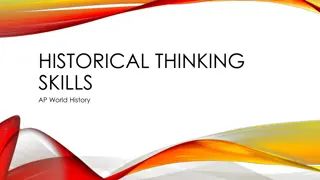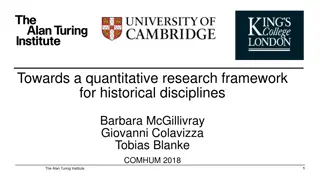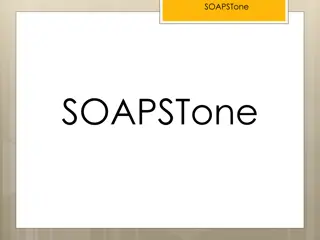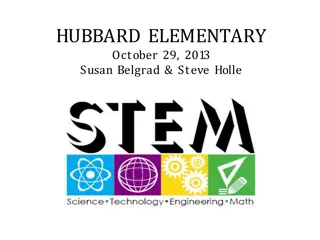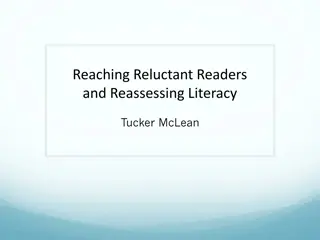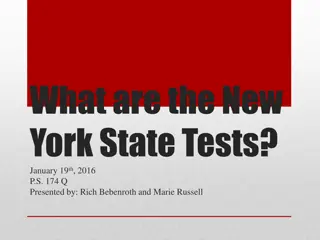Historical Sources as Evidence
Explore the importance of historical sources as evidence in the Victorian Curriculum History context, focusing on how students analyze, evaluate, and utilize sources to create historical explanations and arguments. Discover the significance of primary and secondary sources, perspectives of historica
2 views • 46 slides
Challenges and Solutions in Implementing Historical Competencies in Teaching
Explore the complexities and obstacles faced in implementing historical competencies in teaching, as discussed by Jens Aage Poulsen, a senior lecturer and researcher at HistoryLab, University College Lillebaelt, Denmark. The content delves into competence-based curriculum, core historical competenci
0 views • 7 slides
Wars of the Roses (1445-1461): Source Analysis on the Downfall of Henry VI
This content delves into the Wars of the Roses period (1445-1461) in England, focusing on the outbreak of conflicts, political turmoil, and the downfall of Henry VI. It includes an inquiry topic, sample paper question, and a detailed analysis of a historical source (Source A) by Jack Cade regarding
0 views • 16 slides
Text Features in Nonfiction Texts
Text features are essential components of nonfiction texts that authors use to enhance reader comprehension. They include elements such as tables of contents, indexes, glossaries, and titles, each serving a unique purpose in aiding readers to navigate and understand the content. By utilizing these t
3 views • 15 slides
Examining the Reliability of Historical Texts: From The Bible to Socrates
Investigating the unparalleled popularity of the Bible, the historical significance of Christianity, the reliability of documents related to Socrates, and the critical analysis of potential mistakes in historical texts through comparisons and archaeological findings.
2 views • 13 slides
Historical Research Methods
Historical research is a systematic approach to investigating past events, developments, and experiences. It involves critical examination of evidence, interpretation of sources, and tracing of historical trends to gain insights into social changes. Various definitions by scholars like Kerlinger, Wh
1 views • 21 slides
The Main Idea in Nonfiction Texts
In nonfiction writing, the main idea or central idea is crucial. It represents the most important points that tie all information together within a paragraph. Sometimes, the main idea is stated explicitly, while other times it is implied. Good readers identify key ideas by examining the entire text
8 views • 13 slides
Historical Research: Methods, Purposes, and Aims
Historical research involves investigating past events systematically to provide a dynamic explanation, interpretation, and understanding of the past. It aims to uncover unknown aspects, answer unexplored questions, and link past happenings to the present to enrich human culture and encourage interd
0 views • 20 slides
Namibia's Ancestral Land Rights: Historical Injustice and Restitution
Explore the historical context of land ownership in Namibia, focusing on ancestral land rights, colonization processes, and the impact on indigenous populations. Learn about the notion of ancestral land, who should be considered indigenous, and the colonial modes of land acquisition. Uncover the str
1 views • 33 slides
Overview of Ezra: Historical Background and Key Details
Ezra and Nehemiah, two significant books written as one scroll in Hebrew, cover a historical period from 538-445 BC in Israel's history. The authorship of Ezra is traditionally attributed to both Ezra and Nehemiah, possibly also linked to the Chronicles. This period coincides with other biblical boo
0 views • 31 slides
Creative Nonfiction: A Comprehensive Guide
Creative nonfiction blends literary elements with factual storytelling, aiming to captivate readers with intriguing narratives. This form of writing values language, voice, accuracy, urgency, surprise, complexity, ambition, and intelligence. Writers of creative nonfiction craft pieces such as litera
1 views • 11 slides
Shifts in English Language Arts Standards
Explore the changes in ELA standards focusing on building knowledge through nonfiction, using text evidence, and engaging with complex vocabulary. Teachers across subjects can benefit from these shifts, emphasizing critical reading skills and analytical thinking. Students are encouraged to extract e
0 views • 18 slides
Organizational Patterns in Nonfiction Writing
Explore the key organizational patterns in nonfiction writing through the lenses of cause & effect and compare & contrast. Learn how each pattern helps present information logically and clearly, with examples and interactive activities to enhance understanding.
2 views • 18 slides
Elements of Fiction and Nonfiction in Classroom Activities
Engage students in a week-long journey to explore elements of fiction and nonfiction through class activities centered around reading, discussion, vocabulary building, and comprehension quizzes. From learning terms and definitions to analyzing stories, students will enhance their understanding of di
0 views • 6 slides
Department of Writing and Rhetoric Writing Excellence Awards 2011
The Department of Writing and Rhetoric at Oakland University organized the Writing Excellence Awards in 2011, recognizing outstanding submissions across various categories including writing from/about sources, original research, visual and/or auditory composition, fiction, and creative nonfiction. T
2 views • 42 slides
Key Historical Events and Perspectives
Explore significant historical moments such as the Kennedy Assassination, the First Moon Landing, and the FLQ Crisis, examining the impact of these events on society and the world. Discover the importance of historical thinking skills in analyzing causes, consequences, continuity, and change, as wel
1 views • 11 slides
Analyzing Nonfiction Texts: Comparing Structures and Evidence
Explore how two nonfiction texts, "Watch Your Driving, Kids" and an Allstate Foundation video, present statistics on teen car crashes and propose solutions. Dive into the authors' text organization and credibility, unveiling similarities in the texts' structures and evidence presentation.
0 views • 10 slides
Historical Events and Learnings in World War I Era
In this collection of historical topics, explore events such as the three brothers in a marathon, war strategies in World War I, and GCSE History lessons covering Germany and Britain. Learn about significant battles, alliances, and key figures from this era, including Kaiser Wilhelm II. A starter qu
0 views • 21 slides
The Role of History Writing in Contemporary Academia
The discussion revolves around the practice and purpose of history writing post-Enlightenment, exploring concepts such as human agency, historical change, and the historian's role. It questions the objectivity of historical facts, delves into the influence of the historian's environment, and contemp
0 views • 28 slides
Climate Change Through Melissa Etheridge's Song "I Need to Wake Up
Explore how Melissa Etheridge's song "I Need to Wake Up" sheds light on climate change and global warming. Analyze the impact of nonfiction texts and multimedia, including documentary film techniques, on shaping perceptions and promoting awareness. Delve into the controversy, reactions, and signific
0 views • 23 slides
Reliability and Usefulness of Historical Sources
Photographs, diary entries, and letters are valuable historical sources, providing insights into past events. While photographs offer a snapshot of the truth, they can also be manipulated. Diary entries reflect personal experiences authentically but may lack objective facts. Letters serve as private
0 views • 11 slides
Requirements for Historical Investigation Internal Assessment
Understand the 25% weightage internal assessment comprising 3 sections for a historical investigation. Focus on source evaluation, investigation, and reflection within a 2,200-word limit. Choose a historical topic, analyze primary and secondary sources, and consider causation, consequence, continuit
0 views • 18 slides
American Political System - Historical Foundations Self-Assessment
Explore historical, philosophical, and foundational aspects of the American political system through a self-assessment quiz. Assess your knowledge on constitutional government, limited government, and governance derived from the people as outlined by key historical figures.
0 views • 77 slides
Tracing Verbal Aggression and Facework Strategies Over Time
Dawn Archer and Bethan Malory explore the tracing of verbal aggression and other facework strategies over time using themes from the Historical Thesaurus of English. They utilize automated content analysis tools to analyze datasets from various historical periods and propose solutions for prioritizi
0 views • 41 slides
Fiction and Nonfiction in Language Arts
Fiction and nonfiction are two key genres in literature. Fiction involves imaginative storytelling with elements like plot, characters, setting, point of view, and theme. Nonfiction, on the other hand, deals with real people, events, and ideas, aiming to inform, persuade, or entertain readers. Explo
0 views • 14 slides
Historical Context in Skills Development Discourses
Exploring the evolution of apprenticeship and skills development through historical sociology, historical futures, modes of justification, and complexity concepts. Emphasizing the importance of nuanced historical understanding to navigate contemporary challenges in South Africa's skills development
0 views • 29 slides
Academic Offerings and Staff at Bonnie Branch Middle School
Bonnie Branch Middle School offers a strong academic program in Math and ELA with experienced teachers and staff. The Math and ELA departments provide comprehensive education in various subjects and levels. The school also has dedicated counselors and administrators to support student success. The E
0 views • 12 slides
Leverett Historical Commission Strategic Planning Presentation Overview
Leverett Historical Commission identifies issues with ad hoc requests, lack of clarity on historical property significance, and inadequate maintenance plans. A strategic plan is needed to define assets, determine significance, create guidelines, prioritize restoration efforts, and establish funding
0 views • 9 slides
AP US History Course Overview & Expectations with Mr. Hromadka
This advanced placement course, led by experienced teacher Mr. Jeff Hromadka, focuses on diving into the complexities of US History from its early settlements to modern-day affairs. Students are encouraged to think critically, analyze historical events, and form their own informed opinions. The clas
0 views • 11 slides
Understanding Common Core State Standards ELA/Literacy Focus - Shifts and Text Complexity
The Common Core State Standards for ELA/Literacy require three key shifts, emphasizing regular practice with complex text and academic language, grounding reading, writing, and speaking in textual evidence, and building knowledge through content-rich nonfiction. The importance of practicing with com
0 views • 33 slides
Postmodernism: Literature, Poetry, and Nonfiction in the Contemporary Era
Delve into the Postmodern era from 1939 to the present, characterized by a blend of fiction and non-fiction, diverse narratives, and challenging traditional literary structures. Postmodern literature allows for multiple interpretations, blending different worlds and forms. Postmodern poetry, exempli
0 views • 9 slides
Historical Narratives through Music and Art
This submission presents two original compositions that delve into historical narratives through a unique blend of music and visual art. The compositions aim to reinterpret stories from the past, creating innovative structures and forms. By intertwining various perspectives and utilizing cinematic t
0 views • 8 slides
Enhancing Reading Comprehension Through Text-Dependent Questions
This resource delves into the significance of text-dependent questions in improving students' reading comprehension skills by emphasizing the importance of evidence from the text, building knowledge through nonfiction, and developing critical thinking abilities. It highlights key advances in educati
0 views • 16 slides
Historical Source Analysis Exam Questions Overview
The provided content outlines exam questions related to historical sources, guiding students on analyzing, evaluating, and interpreting information from different sources. The questions cover a range of topics such as learning from sources, assessing accuracy, understanding significance, and making
0 views • 12 slides
Developing Historical Thinking Skills in AP World History
AP History classes aim to cultivate apprentice historians by fostering historical thinking skills (HTS). These skills include Chronological Reasoning, Comparison and Contextualization, Crafting Historical Arguments, and Historical Interpretation. Each skill set equips students with the ability to an
0 views • 15 slides
Quantitative Research Framework for Historical Disciplines
Scholarly communities in historical disciplines are combining quantitative and qualitative methods to study phenomena that change over time. The proposed general methodological reflection aims to enhance research in historical linguistics through quantitatively driven models and claims. Quantitative
0 views • 18 slides
SOAPSTone: An Analysis Strategy for Nonfiction Texts
Explore the SOAPSTone strategy which breaks down nonfiction texts into Speaker, Occasion, Audience, Purpose, Subject, and Tone. Understand how these elements help in analyzing and interpreting written pieces effectively.
0 views • 17 slides
Enhancing Nonfiction Literacy Through Science Education
Embrace the importance of nonfiction literacy intertwined with science education and engineering careers. Encourage students to delve into the world of factual reading and writing to make informed decisions in our ever-evolving society. Utilize the lives and work of scientists and engineers to spark
0 views • 15 slides
Supporting Reluctant Readers in Literacy Education
Reluctant readers are a diverse group with various reasons for their reluctance. Strategies to engage and support struggling readers include creating a safe and supportive environment, interrupting negative thinking cycles with small successes, and providing high-interest, low-vocabulary nonfiction
0 views • 34 slides
New York State Tests Overview: January 19th, 2016 - P.S. 174 Q Presented by Rich Bebenroth and Marie Russell
Students in third to fifth grade at P.S. 174 Q in New York will undergo the NYS ELA, Mathematics, and Science exams. English Language Learners might have exemptions. The testing dates are set in April, with specific time allocations for each subject. The ELA test includes various question formats li
0 views • 12 slides
